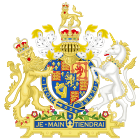Popery Act 1698 facts for kids
| Act of Parliament | |

|
|
| Long title | An Act for the further preventing the Growth of Popery. |
|---|---|
| Citation | 11 Will. 3. c. 4 (Ruffhead: 11 & 12 Will. 3. c. 4) |
| Other legislation | |
| Repealed by | Religious Disabilities Act 1846 |
|
Status: Repealed
|
|
| Text of statute as originally enacted | |
The Popery Act 1698 was a law passed by the Parliament of England in 1700. Its full name was "An Act for the further preventing the Growth of Popery." The word "Popery" was an old term for Roman Catholicism. This law aimed to stop the spread of the Catholic faith in England.
Contents
What Was the Popery Act?
This law was created because some people believed that the number of Roman Catholics was growing. The government wanted to make sure that older laws against Catholics were followed more strictly.
Rewards for Catching Priests
One part of the Act offered a reward to people who caught Catholic priests. If someone found a Catholic bishop, priest, or Jesuit who was leading church services, they could report them. If the priest was found guilty, the person who reported them would get £100. This was like a bounty, or a reward, for finding Catholic priests. Local officials called Sheriffs would pay this money. The government would then pay the Sheriffs back.
Strict Rules for Catholics
The Act also made rules about Catholic priests and teachers. If a Catholic priest led a Mass or other service, they could be jailed forever. This was also true for any Catholic teacher or person who ran a school for young people. Even though this punishment was very harsh, it was actually less severe than an older law from 1584. That older law said that priests who did not leave England could be put to death.
Education and Property
The Popery Act 1698 also stopped Catholics from doing certain things. They were not allowed to run schools. They also could not inherit land or buy land. These rules made it very difficult for Catholics to live freely in England.
When the Law Changed
Over time, some parts of the Popery Act 1698 were changed. In 1778, the Papists Act 1778 was passed. This new law said that Catholics who took a special oath did not have to follow some of the rules from the Popery Act. For example, the part about getting a reward for catching priests was removed. Also, the punishment of being jailed forever for running a school was cancelled.
Finally, the entire Popery Act 1698 was officially cancelled by the Religious Disabilities Act 1846. This meant that the old, strict rules against Catholics were no longer in effect.

